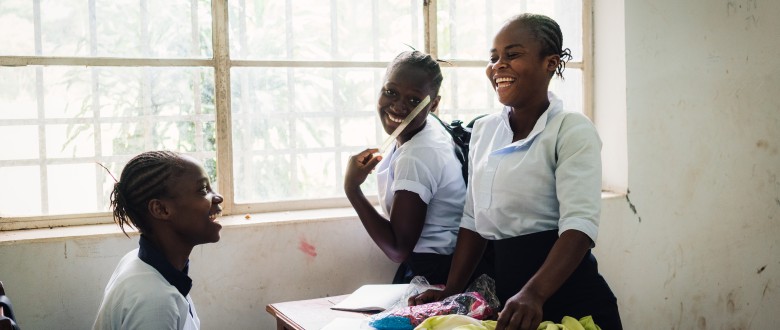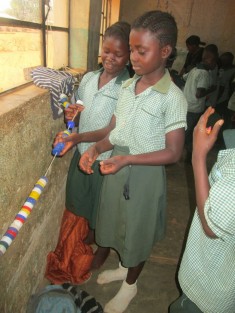
In August 2020, the Mastercard Foundation published ‘Secondary Education in Africa: Preparing Youth for the Future of Work’. The report highlights how secondary education can support African youth in securing opportunities in the world of work. VVOB read and learnt.
Secondary Education in Africa: Preparing Youth for the Future of Work focuses on the role of secondary education in helping African youth prepare for employment and fulfil their potential given the changing nature of work.
Springboard to the world of work
Never before has the world’s adolescent population been so large: there are 1.2 billion adolescents in the world. Africa especially is experiencing a growing youth population. The Mastercard Foundation paints the picture well in their recently published Secondary Education in Africa: Preparing Youth for the Future of Work: Africa is the youngest continent in the world, and the global workforce will increasingly be African.
Preparing its young people with the necessary competences to succeed in the world of work is of crucial importance for the future of the continent. Governments have made many strides in terms of expanding primary education. But with ever more young people completing primary and moving into secondary, the latter is experiencing some stress in guaranteeing equitable access while safeguarding relevance and quality. If general secondary education and secondary technical and vocational education and training (TVET) are to become the springboard to the world of work for most African youth, action needs to be taken now.
The Mastercard Foundation’s Secondary Education in Africa report offers best practices and recommendations for how secondary education can better prepare youth to succeed. VVOB read it and takes away three major lessons.
Lesson #1 – Take care of the foundations
Literacy, numeracy and fluency in the language of instruction build the foundations for all further learning. Too often, these skills are not acquired by the end of primary education. Opportunities for remedial learning are key to success in secondary.
Methodologies like Teaching at the Right Level (TaRL) are very successful on this front. As an active partner in piloting and scaling TaRL in Zambia (right) and, more recently, Uganda, VVOB agrees with the report that remedial learning should start while learners are still in primary. At this level, TaRL can be implemented at lower cost and it will save the cost of grade repetition and drop-out.

Lesson #2 -- Teachers and school leaders are the most valuable investment for quality secondary education
Investing in teachers and school leaders is strategic and cost-effective. They deserve quality initial training, induction and continuous professional development and decent working conditions. In turn, they can be held to high professional standards.
Like the report, VVOB is convinced that quality initial teacher training plays a critical role in creating a ‘virtuous cycle’ of highly professional teachers, excellent teaching and learning outcomes, and high quality trainees entering the teaching profession. That is why we have supported three major universities in the development of a degree programme on Vocational Pedagogy in Ecuador. It also explains our commitment to Uganda’s National Teachers’ Colleges and National Instructors College Abilonino, where future agriculture teachers for lower secondary and secondary TVET are prepared. A key feature of our support lies in building the colleges’ partnerships with the agricultural sector. Through study visits and ‘industrial attachment’, student teachers gain real-world knowledge of work-related content as well as valuable technical skills.
Importantly, professional development opportunities need to be delivered at scale, given that a massive expansion in secondary education is required to meet the learning needs of Africa’s youth. VVOB is proud, therefore, to partner with the Mastercard Foundation in Rwanda, where ICT-enabled professional development is reaching increasingly large numbers. As part of the Leaders in Teaching Initiative, we work closely with the University of Rwanda-College of Education (UR-CE) and the Rwanda Education Board to strengthen school leadership through mentoring and coaching, to support teachers and enable high-quality instruction.
Lesson #3: Collaborate with employers from formal and informal economies for relevant secondary education
When asked about the skills they are looking for, employers and advocates of positive youth development are of a similar mind: stimulating the development of a breadth of skills is best. Relevant secondary education develops sought-after ‘academic’ skills (STEM, language); socio-emotional skills; higher order skills (problem-solving, critical thinking, creativity); and technical skills for sectors and value chains that hold promise for youth employment. Like the report, we are in favour of bridges rather than boundaries between general secondary and secondary TVET.
But dialogue with employers is meaningful beyond the identification of priority skills. In Ecuador, we have developed a sector-based model that has multiple mechanisms for collaboration: enterprises are engaged in technical upskilling of teachers, the development and provision of teaching and learning materials, as well as in study and career guidance and quality internships for students. In partnership with Dubai Cares and the Ministries of Education and Tourism in Ecuador, VVOB is facilitating public-private collaboration in the tourism sector with Skilling for Sustainable Tourism. VVOB fully agrees with the report: cross-sectoral dialogue and stakeholder engagement are key to increasing the relevance of secondary education and to building a broad and strong constituency for the necessary action ahead.




